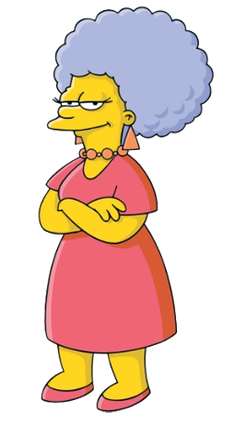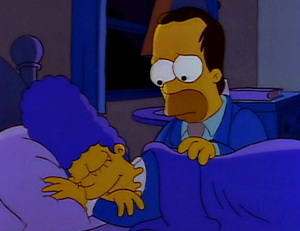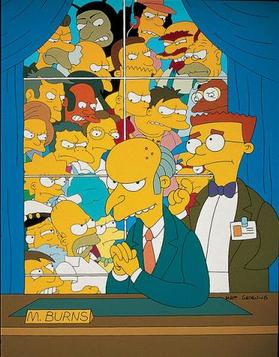
Waylon Joseph Smithers Jr., usually referred to by the names Mr. Smithers, or simply Smithers, is a recurring character in the animated sitcom The Simpsons, voiced by Harry Shearer. His first appearance was in the episode of "Homer's Odyssey", although his voice could be heard in the series premiere "Simpsons Roasting on an Open Fire". He is the consummate executive and personal assistant of Springfield Nuclear Power Plant's owner Mr. Burns, and is usually treated unfairly.
"Three Gays of the Condo" is the seventeenth episode of the fourteenth season of the American animated television series The Simpsons. It originally aired on the Fox network in the United States on April 13, 2003. The episode was written by Matt Warburton and directed by Mark Kirkland.

"Homer's Phobia" is the fifteenth episode of the eighth season of the American animated television series The Simpsons. It first aired on the Fox network in the United States on February 16, 1997. In the episode, Homer dissociates himself from new family friend John after discovering that John is gay. Homer particularly fears that his son Bart will become gay if Bart spends time with John, so Homer decides to do hypermasculine activities with Bart, believing the activities will ensure Bart turns out to be heterosexual.
"There's Something About Marrying" is the tenth episode of the sixteenth season of the American animated television series The Simpsons. In the episode, Springfield legalizes same-sex marriage to increase tourism. After becoming a minister, Homer starts to wed people to make money. Meanwhile, Marge's sister Patty comes out as a lesbian and reveals she is going to marry a woman named Veronica. The episode title is a play on the Farrelly brothers' 1998 romantic comedy There's Something About Mary.
"Simpson and Delilah" is the second episode of the second season of the American animated television series The Simpsons. It originally aired on Fox in the United States on October 18, 1990. In the episode, Homer uses the Springfield Nuclear Power Plant's medical insurance plan to buy Dimoxinil, a miracle hair growth formula. When Homer's bald head sprouts a full mane of hair, he is promoted at work and hires a secretary named Karl. The episode was written by Jon Vitti and directed by Rich Moore, and guest starred Harvey Fierstein as Karl.

"Treehouse of Horror V" is the sixth episode of the sixth season of the American animated television series The Simpsons, and the fifth entry in the Treehouse of Horror series. It originally aired on Fox in the United States on October 30, 1994, and features three short stories: "The Shinning", "Time and Punishment", and "Nightmare Cafeteria".

Patricia Maleficent "Patty" Bouvier and Selma Bouvier-Terwilliger-Hutz-McClure-Discotheque-Simpson are fictional characters in the American animated sitcom The Simpsons. They are identical twins and are voiced by Julie Kavner, who also voices their sister, Marge. Patty and Selma, both gravel-voiced chain-smokers, work at the Springfield Department of Motor Vehicles. They have a strong dislike for their brother-in-law, Homer Simpson, who likewise loathes them. Selma, the elder by two minutes, longs for male companionship and has had multiple brief, doomed marriages, and has herself offered help in some fashion to Marge and Homer as she envies their loving relationship; she receives occasional compassionate support from Homer who even poses as her husband to help her adopt a child. Patty is an initially closeted lesbian who embraces celibacy until she begins dating women. Kavner voices them as characters who "suck the life out of everything". Patty and Selma debuted on the first Simpsons episode "Simpsons Roasting on an Open Fire", which aired on December 17, 1989.
Politics is a common theme in the animated sitcom The Simpsons, and this phenomenon has had some crossover with real American politics. The local politics of the fictional town Springfield feature prominently in many episodes, and character archetypes represent different political concepts within a community. The show satirizes ideas across the political spectrum, though overall it is described as having left-wing and anti-establishment bias. Politicians have been caricatured in many episodes of The Simpsons, including an episode following President George H. W. Bush in response to his public criticism of the show. References to the show also feature in real-world politics. The Simpsons addresses contemporary issues including substance abuse, the economy, education, environmentalism, gun politics, health politics, LGBT rights, immigration, and criminal justice. Episodes of the show have also caused international political dispute for its portrayal of foreign countries.

"The Blunder Years" is the fifth episode of the thirteenth season of the American animated television series The Simpsons. It originally aired on the Fox network in the United States on December 9, 2001. The episode sees Homer, after being hypnotized by the hypnotist Mesmerino while having dinner at the restaurant Pimento Grove, reminded by a repressed traumatic experience from his childhood, including the moment he discovered the dead body of Waylon Smithers' father while having a fun at an abandoned mine. The Simpsons set out to find the corpse that triggered Homer's psychological trauma, which evolves into a murder mystery later in the episode.

"Treehouse of Horror XVI" is the fourth episode of the seventeenth season of the American animated television series The Simpsons. It first aired on the Fox network in the United States on November 6, 2005. In the sixteenth annual Treehouse of Horror, the Simpsons replace Bart with a robot son after Bart falls into a coma, Homer and various other characters find themselves on a reality show where Mr. Burns hunts humans for sport, and costumed Springfieldians become whatever they are wearing, thanks to a witch who was disqualified from a Halloween costume contest.

"I Married Marge" is the twelfth episode of the third season of the American animated television series The Simpsons. It originally aired on Fox in the United States on December 26, 1991. In the episode, Marge worries that she may be pregnant again and visits Dr. Hibbert's office. While anxiously waiting at home, Homer tells Bart, Lisa, and Maggie the story of his and Marge's marriage and Bart's birth. The episode was written by Jeff Martin and directed by Jeffrey Lynch.

The eighth season of the American animated television series The Simpsons originally aired on the Fox network between October 27, 1996, and May 18, 1997, beginning with "Treehouse of Horror VII". The showrunners for the eighth production season were Bill Oakley and Josh Weinstein, while the season was produced by Gracie Films and 20th Century Fox Television. The broadcast season contained two episodes with 3F-series production codes, indicating that were hold-over episodes from the seventh production season, and two episodes with 3G-series production codes, which have never been explicitly confirmed to be part of any specific production season
"Flaming Moe" is the eleventh episode of the twenty-second season of the American animated television series The Simpsons. The episode was directed by Chuck Sheetz and written by Matt Selman. It originally aired on the Fox network in the United States on January 16, 2011.

"Who Shot Mr. Burns?" is a two-part episode of the American animated television series The Simpsons.Part One is the twenty-fifth and final episode of the sixth season and originally aired on Fox in the United States on May 21, 1995, while Part Two is the season premiere of the seventh season and aired on Fox on September 17, 1995.

The twenty-sixth season of the American animated television series The Simpsons premiered on Fox in the United States on September 28, 2014, and concluded on May 17, 2015. The season was produced by Gracie Films and 20th Century Fox Television. The season was ordered by Fox in October 2013. The primary showrunner for the season was Al Jean. In May 2015, the series was renewed for a twenty-seventh and twenty-eighth season.

The twenty-seventh season of the American animated television series The Simpsons began airing on Fox in the United States on September 27, 2015, and ended on May 22, 2016. The season was produced by Gracie Films and 20th Century Fox Television. This season was the first of two seasons ordered by Fox in May 2015. The primary showrunner for the season was Al Jean.
"The Burns Cage" is the seventeenth episode in the twenty-seventh season of the American animated television series The Simpsons, and the 591st episode of the series overall. It first aired on the Fox network in the United States on April 3, 2016.

"Treehouse of Horror XXX" is the fourth episode of the thirty-first season of the American animated television series The Simpsons, and the 666th episode overall as well as the thirtieth Treehouse of Horror episode. It aired in the United States on Fox on October 20, 2019. The episode was written by J. Stewart Burns, and was directed by Timothy Bailey.
"Uncut Femmes" is the seventeenth episode of the thirty-second season of the American animated television series The Simpsons, and the 701st episode overall. It aired in the United States on Fox on March 28, 2021. The episode was directed by Chris Clements, and written by Christine Nangle.
"Portrait of a Lackey on Fire" is the eighth episode of the thirty-third season of the American animated television series The Simpsons, and the 714th episode overall. It aired in the United States on Fox on November 21, 2021. The episode was directed by Steven Dean Moore and written by Rob LaZebnik and Johnny LaZebnik. Its title is a reference to the French film Portrait of a Lady on Fire (2019).













